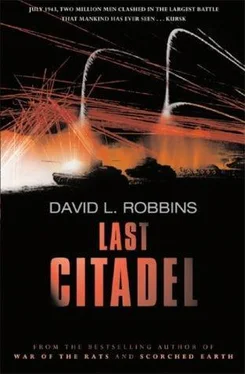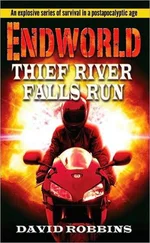The plane traced the road headed north to Oboyan. Breit floated above three concentric layers of Soviet strongholds, each more formidable than the last. The photographer whirled through endless rolls of film. Across the window, exposed rolls danced around him on the plane’s vibrations. Breit lay on his belly staring in realization and awe at what he had done.
The strongest of all the Soviet forces had burrowed in directly along the Oboyan road, opposite the three SS divisions. This was surely a result of the secrets Breit had stolen and delivered to Lucy. He had coded and dropped them in Berlin trash bins, left them on benches, in newspapers and brown bags, in the Tiergarten, in museums and alleys. And now, grown to inconceivable proportions, voila , there the secrets were.
This was a massive Russian army that knew every move the German generals had made.
This was Breit’s handiwork, his painting.
The pilot banked sharply for the German lines. Breit skidded on the smooth pane; under his belly now was nothing but blue air. His vertigo returned. On his hands and knees again, he scooted off the clear floor and stumbled to his seat in the fuselage.
Breit buckled in and closed his eyes. He was relieved that, for a little while, until this plane set down in Russia, there would be nothing more for him to see.
June 31
1030 hours
two kilometers east of Syrtsev
along the Oboyan road
Dimitri craned his neck back and gazed high. A big German plane droned, flying alone above lacy cloud cover. The cross of the plane was far in front of where its sound seemed to come from. Dimitri always resented this illusion of flight; it was a technological marvel created in his lifetime; he was a horseman, a plainsman, and a farmer. He didn’t like the trick played on his senses by the plane. But this one dropped no bombs and was not chased away by Russian fighters. This was probably only a reconnaissance flight, so Dimitri saved his curses. The Germans were snapping photos from three miles up of what Dimitri studied from ground level from his roost on a barrel.
He imagined what the German flyers saw. The yellowish-gray topsoil of the Kursk region highlighted every large-scale move made by both sides. The moment you turned the soil here over with a spade, a bulldozer, a tire or a tank tread, you uncovered that black steppe dirt, painting streaks on the earth like ink arrows that could be seen from the air with ease. So the Germans know what we’re doing, Dimitri thought, keeping his eye on the lazy enemy plane.
He lowered his gaze to the ground, to the immensity of the scars scratched in it stretching as far as he could see, and thought, I’d go home. I wouldn’t attack this.
Three miles below the high ground where he sat sky-watching flowed the skinny Luchanino River. On its banks, one mile to his right, stood the emptied village of Syrtsev. Two miles the other direction was the village of Luchanino. Every silo and home in these places had been turned into a fortification, embedded as part of the 6th Guards defensive works running east-west beside the Oboyan road. The little ghost towns were bristling with weapons and soldiers dug in behind their walls. Now the towns were solid with metal and a vigor that were never given to them in peacetime.
Syrtsev and Luchanino, and Alekseyevka two miles to the west on the riverbank, served their greatest purpose now, waiting to be destroyed, to maul the Germans when they came to cross the Luchanino River here. To Dimitri’s left was the Oboyan road, the grand prize for the German assault, potholed and shredded but busy anyway with tanks and trucks moving up. Taking the Oboyan road was pivotal for Germany; the poor condition of Russia’s transportation system was one of the country’s greatest defenses. Germany had to control the few paved surfaces to bring up supplies, fuel, and reinforcements. Sending their trucks overland through the endless bogs, overrunning streams, mud, and fields of this immense country was not possible for them. Russians alone knew how to navigate the eternal muck, endless snows, swelling rains, the vast distances, with horses, wagons, hand-pulled carts, blisters, courage, anger. This is Russia, Dimitri thought. It does not want to be conquered.
Overhead the German plane banked. It’s going to circle awhile, Dimitri noted, there’s lots to photograph down here.
He kicked his feet against the barrel, dancing his heels on the canister full of diesel fuel. He smiled, almost merry at the scope of the coming battle. This is how you fight a war, he decided. Historic. Big.
Dimitri did not know the numbers, the actual size of what he saw, and he did not care. It was enough that right in front of him – perhaps ten miles across on this clear day, crammed on this flat tableland of central Russia, from the Oboyan road west past the Pena River – was the greatest concentration of rifles, tanks, antitank guns, artillery, mines, barbed wire, blockhouses, and obstacles assembled in the entire war. All the big guns were concentrated and pre-aimed at key points. Over forty thousand antitank and antipersonnel mines had been laid in the ten-mile front of his 6th Guards; that was more than a mine per foot, over a million mines across the whole of the Kursk salient, the explosives laid during the spring in bare fields that were now overgrown with maize, wheat, mustard, sunflowers, and steppe grasses to make the mines almost impossible to detect. The defense works had arisen immense and deep. He’d driven his T-34 past these positions, called pakfronts , during weeks of drills and scrambles. Sixth Guards alone manned two belts in depths up to ten miles and widths to twenty. And there were thirteen more Soviet armies with defenses just as solid throughout the Kursk bulge, with seven extra armies held in reserve. There were eight defensive belts in all, the first three of which were gargantuan, and every one of them was connected by trenches, there must have been a thousand miles of trenches dug on 6th Guards’ front alone. Dimitri shook his head at just what little parcel of it all he could see. When the Germans finally do attack, they’ll have to wade through more than hell. Hell will be just their front door.
What kind of force have the Germans put together on their side to believe they can smash through this? It’s got to be just as big. Just as historic. Dimitri thumped his heels again on the barrel to let the stupendousness of the idea sink in. He was a part of this history, though just a small and insignificant mote. Beneath the humming German plane come to take his picture sitting on his barrel, Dimitri resolved that insignificance would not be his lot.
He stood from the barrel, his rear was sore and imprinted by the metal rim. He waved to the departing reconnaissance plane. Goodbye, he wished to the German pilot and photographer. I hope you got a good look.
He brought his eyes down to the massive groundworks growing by the shovelful in front of where he stood. The sound of the plane faded, the slips of clouds obscured the wings.
Dimitri stretched and yawned. He looked down the little rise from where his company of tanks sat under camouflage netting. One hundred meters away, a thousand civilians hacked at the earth with shovels and picks to excavate an antitank trench. He had been watching these girls, women, and old men work all morning, they dug like people out of the Bible, ancient Jews building something for a pharaoh, they filled buckets with dirt and the dirt was hauled away in barrows to dark piles, and these piles were hauled elsewhere to build protective berms. The ditch had grown to over ten feet deep and wide; it was perhaps a half-mile long. No tank could go into that and expect to get out. These trenches would serve to funnel the enemy attack to preordained channels, directly into minefields or under the sights of Soviet artillery. Dimitri had spent his morning watching these human ants nibbling at the steppe to change it, this was their own fight against the invaders.
Читать дальше












